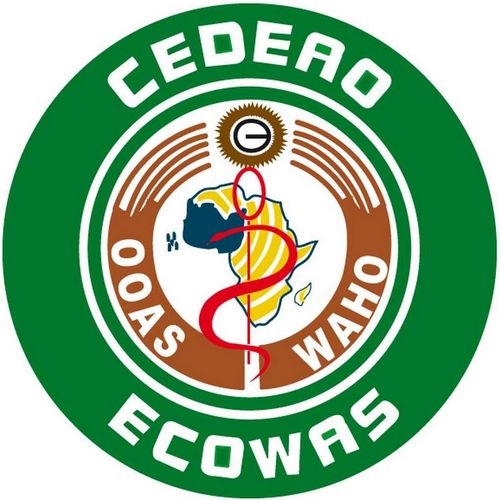Inspired by recent blog posts and a first discussion paper on the regional dimension of responses to the current pandemic of the Coronavirus Disease (Covid-19), this paper echoes the warning against methodological nationalism and the neglect of regional and inter-regional dimensions in the responses to the crisis (in particular Witt 2020; and Engel 2020). It does so by focusing on ECOWAS, as an example of the so-called regional economic communities (REC) that have remained rather neglected compared to the academic attention dedicated to the African Union, especially with regard to the academic attention dedicated to the African Union, especially with regard to the African Peace and Security Architecture (APSA), but also considering other fields of cooperation, such as health. Moreover, this paper centers on an issue that has been mentioned only in passing, namely intra- and inter-regional dynamics of competition and coordination, which become particularly visible from a socio-spatial perspective.
In her post on the blog of the Peace Research Institute Frankfurt (PRIF), Antonia Witt re-constructs the efforts by the African Union to fight Covid-19 to counter-balance a strong (re)emerging focus on national responses, largely focusing on isolation (e.g. closing borders, prohibiting travels).[1] Highlighting in particular the agency of the Africa Center for Disease Control (Africa CDC), launched in January 2017 in response to the Ebola epidemic in West Africa in 2014/15, as an example of “internationalism”. A similar approach is taken by Ulf Engel (2020), comparing approaches by the World Health Organization’s (WHO) Regional Office for Africa, the Africa CDC, and the Ethiopian government. On this basis, Engel argues that while representing a case of internationalism, regional, trans- and inter-regional dimensions (i.e. different spatial scales) also play an important role in the efforts of different African actors, but in particular the African Union, to assume agency in international relations. Although Engel’s contribution explicitly refers to efforts by the African RECs, and the required coordination efforts between them and the African Union (as well as other spatial scales), his analysis does not go into detail about responses employed by those RECs, and how exactly they link (or not) with efforts by the African Union and Africa CDC.[2]
Academic literature on the topic of West African regional responses to epidemics or pandemics, as well as regional health cooperation more generally, is rather limited. So far, only very few publications have touched upon the subject. Knowledge about ECOWAS health cooperation more generally and WAHO in particular remains very thin. What is more, in recent years the institutional landscape has become more complex with the emergence of a stronger regional actor at the continental scale since January 2017, the Africa CDC, and the creation of another specialized ECOWAS (sub)structure, the ECOWAS Regional Center for Surveillance and Disease Control (RCSDC) in 2015/16.
Against this backdrop, this paper, first, provides some background information on the emergence of WAHO and the RCSDC – the two main ECOWAS specialized agencies established to respond to pandemics. Secondly, it looks at the responses by ECOWAS actors to the current Covid-19 pandemic. Third, the paper draws some tentative conclusions with regard to regional and inter-regional dynamics of competition and cooperation in Africa, reflecting on how the current crisis foregrounds ongoing issues of space-making, in particular the continuous construction (and re-construction) of different regional spaces and the organization of spatial order among them.
References
De Coning, C. (2020). “COVID-19: The AU must adapt, not wait. It’s needed now more than ever.” African Arguments, 1 April 2020. Available at https://africanarguments.org/2020/04/01/covid-19-au-more-important-adapt/ (accessed 21 April 2020).
Engel, U. (2020). “Public health policies beyond the state: A socio-spatial analysis of early responses to Covid-19 in Africa.” Discussion Paper. Available at https://www.academia.edu/42838136/_2020_Public_health_policies_beyond_the_state_A_socio-spatial_analysis_of_early_responses_to_Covid-19_in_Africa_2020 (accessed 24 April 2020).
Witt, A. (2020). “An Island of Internationalism: The African Union’s Fight Against Corona.” PRIF Blog, 7 April 2020. Available at https://blog.prif.org/2020/04/07/an-island-of-internationalism-the-african-unions-fight-against-corona/ (accessed 21 April 2020).
[1] For example, an overview of the responses by individual West African states is provided by the OECD’s Sahel and West Africa Club (see http://www.oecd.org/coronavirus/en/#country-tracker, accessed 21 April 2020),
[2] Moreover, a series of blog posts on the news, opinion and research platform African Arguments (www.africanarguemnts.org), have grappled with the implications of the Covid-19 pandemic for Africa. However, the only contribution in this series focusing on regional crisis response, so far, has been the post by Cedric de Coning (2020), discussing some of the problems linked to AU organs such as the Peace and Security Council pausing their work, due to the need to adapt to the new situation.
